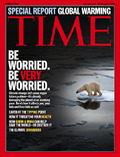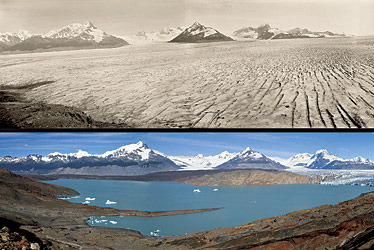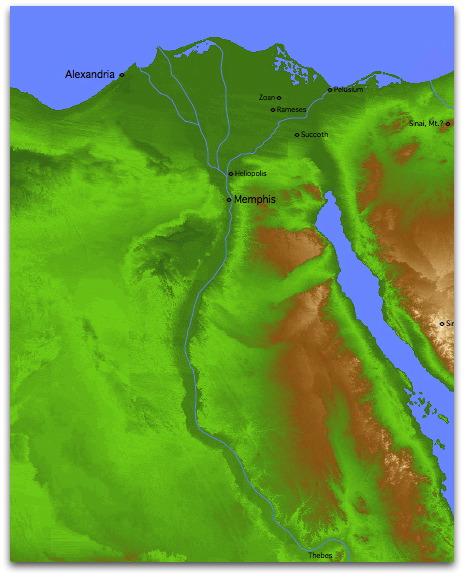Global Warming--It's Time to Start Paying Attention
he created them godlike,
Reflecting God’s nature.
He created them male and female.
God blessed them:
“Prosper! Reproduce! Fill Earth! Take charge!
Be responsible for fish in the sea and birds in the air,
for every living thing that moves on the face of Earth.”
Then God said, “I’ve given you
every sort of seed-bearing plant on Earth
And every kind of fruit-bearing tree,
given them to you for food.
To all animals and all birds,
everything that moves and breathes,
I give whatever grows out of the ground for food.”
And there it was.
God looked over everything he had made;
it was so good, so very good!
It was evening, it was morning—
Day Six.”
(Gen 1:27-31, The Message, emphasis added)
“The Lord God took the man and placed him in the garden of Eden to work it and watch over it.”
(Gen 2:15, HCSB)

If you haven't read the newest issue of Time Magazine yet, I encourage you to go pick up a copy or read it at the library. Although, I can provide you with a link to the main article here, you really need to review the photographs and charts yourself that are only found in the print version.
I confess to you that I've always been a bit skeptical about global warming concerns. How do we know that warming trends are not just part of normal earth cycles? How do we know for certain that humans are the cause? Is there anything we could really do about such things anyway? And I admit that in my skepticism I've used these kinds of questions as an excuse to ignore the problem. But the problem is upon us. The problem is real and its here.

"So what?" you ask. Well, this isn't just confined to one glacier. It's happening all over the world. Not only are glaciers melting, but so are polar caps and permafrost. This huge amount of ice is part of God's system for maintaining life on this planet. The ice does two things. Not only does it help keep ocean temperatures at an optimal level, but it also reflects unneeded sunlight back into space. Take away the ice, and not only do you start to lose many of your coastlines, but things start to warm up all over the planet. The latter is more significant than just causing you to run your air conditioner a little harder. The warmer oceans spawn tsunamis and hurricanes with a much greater intensity than what we've been used to over the last few thousand years.
What causes glaciers and ice caps to melt? Well, there are lots of factors, but undeniably, carbon dioxide (CO2)plays a real part in this. We need CO2 to maintain the temperature levels we are used to, but too much of it has dangerous side effects. CO2 in our atmosphere allows sunlight to come in while preventing the heat from going back out. But you could see why too much would be a bad thing. What causes too much CO2 in our atmosphere? Well, lots of things. Some causes are natural such as volcanic eruptions (above and below the sea), forrest fires, and natural biological decay of plant and animal matter. But burning fossil fuels (the stuff that makes your car move) also releases CO2 into the atmosphere. Not only gasoline, but also coal for electricity causes these emissions, called greenhouse gasses. And it's a cycle that feeds off itself exponentially. For instance, as the permafrost (ground frozen since the ice age) starts to melt in places like Alaska, Canada, and Siberia because of the factors described above, biological matter that has been frozen since before the ice age has begun to decay, adding even more CO2 to our atmosphere.
I firmly believe in the "anthropic principle, which states that from its very inception the universe was fine-tuned for the emergence of human life." Consider this explanation from Norman Geisler's Systematic Theology, vol. 1:
...oxygen comprises 21 percent of the atmosphere. If it were 25 percent, fires would erupt, and if only 15 percent, humans would suffocate. If the gravitational force were altered by merely one part in ten to the fortieth power (ten followed by 40 zeros), the sun would not exist and the moon would crash into the earth or veer off into space ... If the centrifugal force of planetary movement did not precisely balance the gravitational forces, nothing could be held in orbit around the sun. If the universe were expanding at a rate one-millionth more slowly than it is, the temperature of the earth would be 10,000 degrees celsius. If Jupiter were not in its current order, the earth would be bombarded with space material. If the earth's crust were thicker, too much oxygen would be transmitted to it to support life. If it were thinner, volcanic and tectonic activity would make life untenable. And if the rotation of the earth took longer than twenty-four hours, temperature differences between night and day would be too great... (33-34).
The anthropic principle extends to the very makeup of our atmosphere in relation to our ability to function and survive in the planetary home God has given us. Sadly, humankind has a poor track record of showing gratitude for God's provision. This goes all the way back to Genesis 3, does it not?
The article series in Time did not give definitive hope that global warming can be averted. It may in fact be too late. The ball may be rolling, and rolling exponentially. But that doesn't mean that we can't try--that we can't begin to change our ways now. If the Lord tarries, and we do nothing, this will not mean devastation in our generation, but life would certainly be of a different quality within three or four generations.
What can we do?
First, we have to stop sticking our heads in the sand over this issue. We can no longer dismiss it as the rantings of the political left or environmental extremists. A newly formed group, the Evangelical Climate Initiative, is looking for ways to address the problem. Their website is worth exploring. View their statement here. Also note the significant number of supporters from both academic and ecclesiastical circles of the Evangelical world, including men like David Dockery, Timothy George, David Gushee and Rick Warren.
Second, we have to start taking earth stewardship seriously. The Bible speaks quite a bit about these issues. In the long-run, it could even be the number-one pro-life concern.
Third, while we must take responsibility for the task God has given us to take care of his earth, we cannot forget that ultimately God is in control of our future. That's not an excuse to ignore global warming or any other issue, but it is a reminder that we have a hope and a future.
“The earth is the Lord’s, and all it contains,
The world, and those who dwell in it.”
(Psa 24:1 NASB)
Download-- Evangelical Climate Initiative booklet:
eci-booklet
Quote for the Day #6: Pseudo-Phocylides
Do not hide a different thought in your heart while uttering another.
Change not yourself according to the spot, like a polyp that clings to the rock.
Be sincere to all, speak what is from your soul.
Whoever wrongs willfully is a bad man; but if he does so under compulsion,
I shall not pass sentence, for it is each man's intention that is examined.
Do not pride yourself on wisdom nor on strength nor on riches.
The only God is wise and mighty and at the same time rich in blessings.
Do not afflict your heart with bygone evils;
for what has been done can no more be undone.
--The Sentences of Pseudo-Phcylides, lines 48-56, written perhaps somewhere between 30 BC and AD 40.
Dog Haiku

These haikus will only mean something to you if you own and/or like dogs. Otherwise, please move along...
I love my master;
Thus I perfume myself with
This long-rotten squirrel.
I lie belly-up
In the sunshine, happier than
You ever will be
Today I sniffed
Many dog butts--I celebrate
By kissing your face.
I sound the alarm!
Paperboy--come to kill us all--
Look! Look! Look! Look! Look!
I sound the alarm!
Mailman Fiend--come to kill us all--
Look! Look! Look! Look! Look!
I sound the alarm!
Meter reader--come to kill all--
Look! Look! Look! Look! Look!
I sound the alarm!
Garbage man-come to kill us all--
Look! Look! Look! Look! Look!
I sound the alarm!
Neighbor's cat--come to kill us all!
Look! Look! Look! Look! Look!
I lift my leg and
Wiz on each bush. Hello, Spot -
Sniff this and weep
My human is home!
I am so ecstatic I have
Made a puddle
Sleeping here, my chin
On your foot -- no greater bliss -- well,
Maybe catching cats
Look in my eyes and
Deny it. No human could
Love you as much I do
The cat is not all
Bad--she fills the litter box
With Tootsie Rolls
Dig under fence--why?
Because it's there. Because it's
There. Because it's there.
I am your best friend,
Now, always, and especially
When you are eating.
Whither the Land of Cush?

First, read the message I posted on the Accordance Support forum early Sunday morning:
For today (March 26) Southern Baptist Sunday School literature focused on Isa 17-18. In ch. 18, there were references to the land of Cush (Ethiopia in some translations). I usually put together a handout for the class that I teach, and I had hoped to include a map that showed where the land of Cush was. I had even greater hopes of finding a map that demonstrated that Cush was actually greater in size than merely modern-day Ethiopia.
So I fired up the Accordance Bible Atlas, and I was disappointed to see no entry for the land of Cush. I tried searching for Ethiopia, but no luck there either. I looked in other modules that I have such as the Anchor Bible Dictionary and the IVP New Bible Atlas, but no luck. I even looked in the Photoguide thinking maybe I could find photographs from the region. But nothing.
From there, I fired up VirtualPC where I keep a few Windows Bible programs from my pre-Mac days (I switched in 1998). The version of Logos Bible Atlas had nothing, and neither did the map module in Wordsearch.
Even a Google image search yielded nothing (except for some really weird stuff).
All of these programs are in equal standing it seems. There are also no references to Cush in the maps in the back of my Bible! I've decided this morning just to tell my class to think "south of Egypt, going down the Nile."
Here's my question... I admit that I don't have the newest version of the Accordance Bible Atlas. Just out of curiosity, is Cush included in the new Atlas? Admittedly, Cush would be the very southwestern edge of the biblical world, but I would think that it's mentioned enough in the Bible to warrant inclusion in a biblical atlas.
Today, David Lang of Accordance responded to my message confirming that Cush was not included in the newer version of the Atlas either, but should probably be added in a future release. I'm not surprised at this point. My search has not been exhaustive, but I can't find one decent depiction of Cush anywhere. I don't have a map of Cush in any Bible or any reference book (that I know of).
What exactly was the extent of Cush? Grogan (EBC) notes the following:
[Cush] designates a much larger area than present-day Ethiopia--an area including the Sudan and Somalia. This somewhat mysterious area, situated at one of the limits of the normal biblical world, had come right into the world in Isaiah's day. It was normally in Egypt's area of influence and, usually, of control; but for a period during the eighth century, Egypt was ruled by an Ethiopian dynasty.
If you know of a good cartographical depiction of ancient Cush, please share.
Incidentally, one person commented in the Accordance forums that my description "south of Egypt, going down the Nile was incorrect." The Nile oddly flows northward, so the direction to Cush should be "south of Egypt, going UP the Nile!"
Bugs or Boats? Isaiah 18:1 in the NLT & the LXX
A few weeks ago, I wrote a blog entry entitled "Romans 14:4 in the NLT." It was in response to a seemingly odd translational choice in the New Living Translation (NLT) discovered by my wife while studying her Sunday School lesson. Upon further examination, I discovered it wasn't as odd as first thought; it was just an example of the dynamic equivalent method of the NLT translators.
Well, it happened again last night. Kathy had her copy of the NLT next to her Sunday School book which includes both the Holman Christian Standard Bible (HCSB) text as well as the King James Version (KJV). Again, she made the statement, "Well my Bible reads completely different in this passage."
The passage in question is Isaiah 18:1. Note the original Hebrew below and a selection of a few recent translations:
BHS |
HCSB |
ESV |
TNIV |
| ה֥וֹי אֶ֖רֶץ צִלְצַ֣ל כְּנָפָ֑יִם אֲשֶׁ֥ר מֵעֵ֖בֶר לְנַֽהֲרֵי־כֽוּשׁ׃ |
Ah! The land of buzzing insect wings beyond the rivers of Cush |
Ah, land of whirring wings that is beyond the rivers of Cush | Woe to the land of whirring wings along the rivers of Cush |
Geoffrey Grogan notes in the Expositor's Bible Commentary that "The phrase 'the land of whirring wings' (v. 1) is highly evocative for any hearer or reader who has been in the Nile valley, with its swarms of insects." And most, in fact, are agreed that the reference to whirring wings is a reference to bugs. Note that the translators of the HCSB, under their guidelines of "optimal equivalence" felt free to even add the word "insect" to the verse for the sake of clarity.
But there are no bugs in the NLT's rendition of this verse. The NLT (2nd ed.) reads, "Listen, Ethiopia--land of fluttering sails that lies at the headwaters of the Nile... ." The fluttering sails here are undoubtedly referring to the sails of boats as evidenced in 18:2, "that sends ambassadors in swift boats down the river."
Why the boats instead of bugs? Good question. At the very least, the NLT is being consistent in it's roots to the original Living Bible. Compare all three editions together:
The Living Bible (1971) |
New Living Translation (1st ed./1996) |
New Living Translation (2nd ed./2004) |
| Ah land beyond the upper reaches of the Nile, where winged sailboats glide along the river! |
Destruction is certain for the land of Ethiopia, which lies at the headwaters of the Nile. Its winged sailboats glide along the river. | Listen Ethiopia--land of fluttering sails that lies at the headwaters of the Nile, |
Of course, the Living Bible traced its roots to the 1901 American Standard Version (ASV) of which it was a paraphrase. But contrary to the Living Bible/New Living tradition, even the ASV seems to imply bugs (or birds?):
"Ah, the land of the rustling of wings, which is beyond the rivers of Ethiopia."
So where do the boats come from? Well, upon further investigation, I found that the boats tradition goes back to the Septuagint (LXX), the Greek translation of the Hebrew Scriptures from the second century BC. Below is the LXX along with my translation:
LXX |
Translation |
| οὐαὶ γῆς πλοίων πτέρυγες ἐπέκεινα ποταμῶν Αἰθιοπίας |
Woe to the wings of the land of boats beyond the rivers of Ethiopia. |
Undoubtedly, the Living/New Living tradition is based on the LXX and not on the Hebrew text. But the real question is "Why?" Unfortunately I don't know. Perhaps someone does and can offer an explanation in the comments. I might only speculate that perhaps Kenneth Taylor, when working on the original Living Bible consulted a commentary that drew a connection between the buzzing of insect wings and the flapping of sails. Or perhaps he read a source that made a case for the wording of the LXX. Undeniably, there's a connection being made between the insects of v. 1 and the boats of v. 2. That was enough for the translators of the LXX evidently.
Personally, I'd want to stick with the Hebrew tradition.
If you have a definitive answer as to how the LXX tradition found its way into the Living Bible/New Living Translation, please share it in the comments.
Siworae/Il Mare (The Sea)

In the meantime, I highly recommend viewing the original South Korean version if you find it being shown somewhere or if you can pick up a copy on eBay which is where I found my copy. A number of the Far East films I've obtained from eBay have been bootlegs, but I was pleased to see that my copy of Siworae was not. However, my RCA DVD player is quite finicky with Asian-made DVDs, and I had to watch the movie on my PowerBook where I viewed it without any problems.
I can set up the plot for you and give away the movie's "gimmick," but that's all that I can do. Anything more would spoil the story. Even giving away the gimmick seems unfair, but otherwise, why would you want to see this movie just based on my telling you to?
The movie begins with a young woman, Eun-ju moving out of a house on the sea shore and a new resident, Sung-hyun (a construction worker) moving in. As Sung-hyun begins to settle in, he receives a letter from the previous owner asking him to forward her mail. The problem is that Sung-hyun is actually the first owner of the house which was just built for him by his famous architect father. As the two continue to exchange letters, they not only begin to draw closer, but they also realize that their letters are going through time and they are writing two years apart.
This is enough to set up the story, and to tell you more would be to give too much away. Exactly how the letters are able to transverse time is not exactly explained. Is the red ornamental mailbox outside the house enchanted? Or is the little dog, "Cola" who is cared for by both residents some kind of magical link? Who knows? One thing I've observed in watching quite a few Asian films in recent years is that there's no Western obsession with how things "work." As opposed to our stories in which we want good and logical explanations for anything seemingly supernatural, Asian culture is content to let magic remain a mystery, a given part of the world as they know it. What's interesting is that often when these movies get remade for American cultures, there is an attempt to explain the reason behind supernatural events for Western audiences. A prime example is the film Juon which was remade into the American thriller, The Grudge. In the original, there's no attempt to explain the supernatural events. In the remake we're given an explanation.

The cinematography is extremely well done in this film. The use of a steady cam in many of the scenes creates movement around characters that are standing still and enhances the feeling of getting caught up in the emotions of the scenes. Food and cooking is a minor theme throughout the movie, but the way these scenes are shot, it made me wonder if the cinematographer or perhaps the director had experience with cooking shows. If you watch this movie you'll understand what I mean.
If you're not used to watching Asian movies, you might find the pacing a bit slow, but the need to follow the subtitles will be enough to keep you engaged. The subtitles themselves were obviously done by someone whose native language was not English, but the dialogue was still easy enough to follow nonetheless.
Il Mare is Italian for "The Sea." This is the name that Sung-hyun gives to the house his father has built. I'm not sure if the Korean word, Siworae means "the sea" or if it means "A Love Story." Perhaps someone can tell me. All three titles are on the packaging of the DVD. Again, I recommend this movie for you to see right now, and it will be interesting to see how The Lake House compares to it when released later this year.
The Biblical Slacker
As I've been teaching from the HCSB and reading through it, too, I enjoy its freshness because it is the first Bible I've ever used as my primary translation that is outside the Tyndale tradition. And although sometimes I find it's renderings odd (like "deluge" instead of "flood" in Genesis), I am also delighted when I come across a word or phrase that communicates a biblical meaning in both a new and precise way.
One of these is the HCSB's use of "slacker" for "lazy" (רָפָה/raphah) in Exodus and "sluggard" (עָצֵל/atsel) in Proverbs.
The Mirriam-Webster Dictionary defines slacker as "a person who shirks work or obligation." See if that definition works in these verses:
But require the same quota of bricks from them as they were making before; do not reduce it. For they are slackers—that is why they are crying out, ‘Let us go and sacrifice to our God.’ (Ex 5:8)
But he said, “You are slackers. Slackers! That is why you are saying, ‘Let us go sacrifice to the Lord.’ (Ex 5:17)
Go to the ant, you slacker!
Observe its ways and become wise. (Prov 6:6)
How long will you stay in bed, you slacker?
When will you get up from your sleep? (Prov 6:9)
Like vinegar to the teeth and smoke to the eyes,
so the slacker is to the one who sends him on an errand. (Prov 10:26)
The slacker craves, yet has nothing,
but the diligent is fully satisfied. (Prov 13:4)
A slacker’s way is like a thorny hedge,
but the path of the upright is a highway. (Prov 15:9)
The slacker buries his hand in the bowl;
he doesn’t even bring it back to his mouth. (Prov 19:24)
The slacker does not plow during planting season;a
at harvest time he looks,b and there is nothing. (Prov 20:4)
A slacker’s craving will kill him
because his hands refuse to work. (Prov 21:25)
The slacker says, “There’s a lion outside!
I’ll be killed in the streets!" (Prov 22:13)
I went by the field of a slacker
and by the vineyard of a man lacking sense. (Prov 24:30)
The slacker says, “There’s a lion in the road—
a lion in the public square!" (Prov 26:13)
A door turns on its hinge,
and a slacker, on his bed. (Prov 26:14)
The slacker buries his hand in the bowl;
he is too weary to bring it to his mouth. (Prov 26:15)
In his own eyes, a slacker is wiser
than seven men who can answer sensibly. (Prov 26:16)
Don't you just love the word "slacker"? What a great word to use in these contexts. You know, when I used to teach high school, I got to use the word "slacker" a lot. Thanks to the HCSB, I'll be able to continue using it!
This Is Deplorable: Afghan Man to Be Excuted for Converting to Christianity

From Christianitytoday.com:
It doesn't look good for Abdul Rahman. The judge in his case says the 41 year old clearly violated Islamic law by converting to Christianity. "If he doesn't regret his conversion, the punishment will be enforced on him," the judge said. "And the punishment is death."
The Chicago Tribune has changed its headline from "Afghan man faces death for being a Christian" to "Afghan man faces death for abandoning Islam." But both the judge and prosecutor (Rahman doesn't have a defense attorney) have said his crime isn't just conversion.
"It is illegal to be a Christian and it should be punished," the judge was quoted as saying in the Toronto Globe and Mail. Prosecutor Abdul Wasi told The Times of London, "We are Muslims and becoming a Christian is against our laws. He must get the death penalty."
Required Reading:
"Democratic Apostasy: The Martyrdom of Abdul Rahman" (Chuck Colson/BreakPoint)
"Whoever Changes Religion--Kill Him" (The London Times)
What You Can Do:
Contact your representative and senators (Capitol switchboard: 202-224-3121) and President Bush (e-mail president@whitehouse.gov or call 202-456-1111), and urge them to take action to prevent the execution of Afghan Christian Abdul Rahman.
My letter to the President (sent 3/21/2006):
Mr. President,
We MUST NOT allow Afghan authorities to execute Abdul Rahman because of his conversion to Christianity. Even if we have to "liberate" him from his confines. Such an execution would fly in the face of everything that's been accomplished. He should also be allowed to reclaim custody of his children.
Sincerely,
Rick Mansfield
UPDATE: As you probably well, know, Abdul Rahman was released and is now in asylum in Italy. Commentary I've heard says that blogs all around the country put pressure on our governments to pressure the Afghan government to Free Mr. Rahman.
V for Vendetta

the fifth of November,
gunpowder treason and plot.
I see no reason
why the gunpowder treason
should ever be forgot
Okay, writing a movie review is really cheating on my blog hiatus, so I'll try to make this quick.
Kathy and I went to see V for Vendetta last night, the latest offering from Andy and Larry Wachowski, the creators of the Matrix trilogy. Regardless of how it will be received at the box office, I believe this movie to be a significant motion picture which is why I'm violating the break from my blog to comment on it.
The story itself has been adapted from a graphic novel by Alan Moore, although you won't see his name in the credits. Moore has totally disassociated himself from this picture. Supposedly he has been unhappy with previous movie treatments of his works including From Hell and The League of Extraordinary Gentlemen. I've also heard that he did not approve of the script for this movie. There are some very disturbing things about this film which I'll detail below, but Moore is no stranger to the disturbing; so I don't know if this had any impact on his distance from the project or not.
The movie itself takes place in some kind of alternative timeline in which the United States, locked into a civil war, is no longer a world power; and Britain has become a fascist state under a totalitarian dictator (played by John Hurt) with shades of Adolf Hitler. Irrelevant note: I observed that some of the characters in Britain (where the movie entirely takes place) were using current-day Dell computers. I wonder if Dell relocated to Britain before the US Civil War?

Hugo Weaving had the incredible challenge to act throughout the entire movie using only his voice and body language because his face was completely hidden behind the mask. You don't even see moving lips or eyes. Perhaps only Weaving could do this. Perhaps this kept us from seeing V as Mr. Smith or Elrond. Regardless, I imagine that only a Shakespearean-trained actor could have pulled such a role off. Weaving does it well. And V tends to talk fast and eloquently, so the viewer has to pay close attention. It might be worth seeing this movie again just to listen to Weaving deliver some of his lines. Consider V's introduction of himself to Evey:
This visage, no mere veneer of vanity, is it vestige of the vox populi, now vacant, vanished, as the once vital voice of the verisimilitude now venerates what they once vilified. However, this valorous visitation of a by-gone vexation, stands vivified, and has vowed to vanquish these venal and virulent vermin vanguarding vice and vouchsafing the violently vicious and voracious violation of volition. The only verdict is vengeance; a vendetta, held as a votive, not in vain, for the value and veracity of such shall one day vindicate the vigilant and the virtuous. Verily, this vichyssoise of verbiage veers most verbose vis-à-vis an introduction, and so it is my very good honor to meet you and you may call me V.
What the Matrix was to philosophy, V for Vendetta is to British literature and history. Although there is certainly a good amount of philosophy, too--especially political philosophy. Consider V's line, "People should not be afraid of their governments; governments should be afraid of their people." And when V began to speak of causality, I thought I was having a flashback to the Merovingian in Matrix Reloaded. The movie borrows themes from a number of stories from the past including Phantom of the Opera, Orwell's 1984, and even Bradbury's Fahrenheit 451.
A person could certainly see this movie as yet another a tale of revenge, or perhaps even a "beauty and the beast"-type love story, but I believe there is a much darker message below the surface of this film.

Now, in no way do I believe that we live in that kind of world, but that doesn't mean that there aren't certain individuals in our society who interpret the Bush administration's response to 9/11, especially in regard to the Patriot Act, as a significant limitation of our personal freedoms. Allusions to the ideological clash between traditionalists in our country and those who would advocate "lifestyle choice" surely can't be missed in this movie, let alone references to pedophile priests in light of the tragic events of the recent past. In V's world, even the Koran is illegal, and having a copy is grounds for the death penalty.
My fear is that a movie like V for Vendetta could move an unstable mind on either the extreme far left OR the extreme far right to resort to violent means against the government or even the church to send a message. Think I'm paranoid? Consider V's statement justifying the blowing up of the Parliament building: "The building is a symbol, as is the act of destroying it. Symbols are given power by people. Alone a symbol is meaningless, but with enough people involved as well, blowing up a building can change the world." Such a suggestion in a movie after 9/11 seem unimaginable, yet here it is.
V for Vendetta is undeniably meant to draw allusions to current political situations in our country. The fact that it is set in Britain is entirely a smokescreen. This movie is written to be provocative. The difference is that we do not live in a totalitarian state. If the majority of our citizens don't like public policy, we have the freedom to vote our leaders out of office. That was not really an option in V's alternate reality. Nor are a handful of abusive clergy the norm considering we have tens of thousands of priests and pastors who would never dream of harming a child.
My hope is that V for Vendetta will be seen as a movie and only that. I don't deny that it is very entertaining at times, and there are terrific performances by Weaving and Portman. However, I shudder to think what could happen from the hands of those who have trouble distinguishing between fantasy and reality.
Call for NT Survey Bibliography Suggestions
No, I'm not back to regular blogging--still officially on hiatus. However, if anyone is still checking in at this point, I need some help with something that has nothing to do with my prospectus.
Back a few months ago, I actually sat down and read the adjunct faculty handbook for IWU and noted that we are encouraged to provide a bibliography of related and further reading in our syllabi. As I've taught new classes, I've been steadily updating old syllabi by adding bibliographies.
In late April, I'll be teaching a NT Survey course at the Louisville branch of IWU. I'm calling for suggestions for the bibliography. Keep in mind that these are not religion majors, but actually business students who are required to take the NT Survey class. I am looking for books that I can recommend for those who want to dig a bit deeper or read a bit further on the subject. Books about the NT, Bible in general, principles of interpretation are the kind of thing I'm looking for.
I don't know how many will actually see this since I've said I am not blogging again until the end of April, but if you have any suggestions, feel free to add them to the comments. And don't tell Kathy that I added a blog entry. I'd get an "I told you so" from her!









